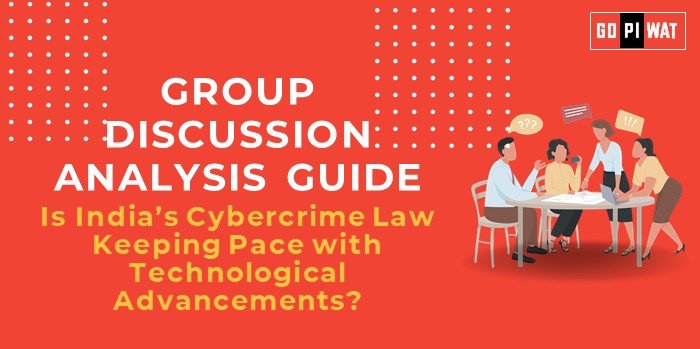📋 Group Discussion (GD) Analysis Guide: Is India’s Cybercrime Law Keeping Pace with Technological Advancements?
🌐 Introduction to the Topic
- Opening Context: With India rapidly digitizing and cybercrimes increasing in sophistication and frequency, evaluating the adequacy of India’s cybercrime law becomes imperative.
- Topic Background: The Information Technology Act, 2000, forms the cornerstone of India’s cybersecurity legal framework. While subsequent amendments and policies address evolving threats, questions persist about their efficacy in tackling issues like ransomware, identity theft, and AI-driven fraud.
📊 Quick Facts and Key Statistics
- Cybercrimes Reported (2023): Over 50,000 cases, reflecting a 20% annual increase (NCRB).
- Internet Users in India: 900 million+ (IAMAI, 2024).
- AIIMS Cyberattack (2022): Compromised medical data of over 3.5 million patients.
- Global Ranking: India ranked 10th in the Global Cybersecurity Index (ITU, 2023).
🤝 Stakeholders and Their Roles
- Government Agencies: Enact laws, enforce cybersecurity measures, and raise awareness (e.g., CERT-In, Ministry of Electronics and IT).
- Private Sector: Secure systems against breaches, innovate cybersecurity tools, and ensure compliance.
- Citizens: Practice cyber hygiene and report incidents.
- International Bodies: Facilitate collaboration through treaties like the Budapest Convention.
🏆 Achievements and Challenges
- Achievements:
- CERT-In Initiatives: Coordinated responses to 1.4 million incidents in 2023.
- Cyber Swachhta Kendra: Raised digital hygiene awareness among 5 million users.
- Data Protection Act, 2023: Strengthened data privacy regulations.
- Challenges:
- Legal Outdatedness: IT Act inadequacies in addressing AI and IoT crimes.
- Digital Divide Impact: Rural areas remain vulnerable due to limited resources.
- Global Comparisons: Estonia’s digital ecosystem thrives with stronger legal frameworks.
🔍 Case Study:
The AIIMS ransomware attack exposed systemic flaws in cybersecurity protocols.
📑 Structured Arguments for Discussion
- Supporting Stance: “India’s cybersecurity laws have evolved significantly with initiatives like the Data Protection Act, setting a precedent for emerging economies.”
- Opposing Stance: “The IT Act’s failure to address AI and quantum computing threats hampers India’s ability to combat advanced cybercrimes.”
- Balanced Perspective: “While India’s cyber laws address foundational threats effectively, the legal framework requires frequent updates to match technological advancements.”
🗨️ Effective Discussion Approaches
- Opening Approaches:
- Quote global cybersecurity rankings to highlight India’s progress and gaps.
- Use the AIIMS ransomware attack as a thematic anchor.
- Counter-Argument Handling:
- Acknowledge progress and suggest modernizing laws through stakeholder collaboration.
- Highlight successful global practices (e.g., Estonia).
📊 Strategic Analysis of Strengths and Weaknesses
- Strengths: Increased government focus, rising awareness, and public-private partnerships.
- Weaknesses: Legal gaps, implementation delays, lack of skilled professionals.
- Opportunities: Leveraging AI for real-time threat detection, fostering global collaborations.
- Threats: Rising cyber warfare, advanced persistent threats (APTs).
📘 Connecting with B-School Applications
- Real-World Applications: Exploring the financial and operational risks of cyberattacks in business strategies.
- Sample Interview Questions:
- How can India’s cyber laws influence global partnerships?
- What role does cybersecurity play in digital financial inclusion?
- Insights for Students: Emphasize strategic alignment between legal frameworks and business risk management.


